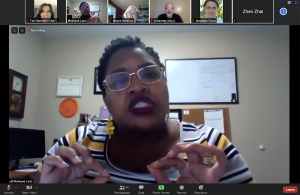Published on June 14, 2020

Monique Luisi has the floor during a Zoom meeting at the 2020 Celebration of Teaching online event. Educators discussed a myriad of topics, including those addressed in the “Pedagogies of Care” series of open-source material.
When the COVID-19 pandemic made its way to higher education in March, Jenae Druckman Cohn was prepared to be part of the pivot. As an academic technology specialist for the Program in Writing and Rhetoric at Stanford University, one of the first institutions to make the wholesale switch to remote learning, she leapt into action.
“Moving to an emergency remote situation was a bit anxiety producing, mostly because I knew it wasn’t what students were used to or what they wanted,” says Cohn, who brought her expertise to the MU Teaching For Learning Center’s online “Celebration of Teaching” May 27. “This event, in addition to being a celebration, was also about forming collaborative relationships to address how different parts of campus might work together to improve the student experience.”
Cohn is one of 16 educators and authors — brought together by Tori Mondelli, the director of the Teaching For Learning Center — contributing to “Pedagogies of Care,” a collection of open-source resources sharing expert insights for faculty amid emergency remote instruction. The authors, including Mondelli, all have works published (or coming soon) by the West Virginia University Press’ Teaching and Learning in Higher Education series edited by James M. Lang.
“Teaching, historically, has been sort of isolating,” Mondelli says. “Since the ’90s, with the proliferation of teaching for learning centers, we’ve been busting down that mode of thinking. When we were thrust into COVID-19, a lot of educators did feel utterly alone again.
“One of the big themes here is, ‘You’re not in this alone. We are all in this together.’ ”
Additional Resources
The authors, who were invited to contribute via whatever media they felt best captured and delivered their messages, rallied around the concept of “care.” The result is a mix of video, podcast, infographic and written-word presentations Mizzou staff used to augment the “Celebration of Teaching” program. Coupled with discussion prompts and activities to promote engagement, virtual attendees took part in lively and memorable sessions.
Although some of the materials are focused on the sudden transition to online instruction, others are more foundational and will be useful to educators beyond this particular moment. They all provide basic principles along with concrete examples of practices — specific techniques every college and university instructor can immediately adopt.
Mondelli sees this collaborative and open practice not only as the wave of the future, but also as a necessity.
“As educators, there’s no need for people to be constantly re-inventing the wheel,” Mondelli says. “We need more consortia with reciprocity. We need more open collections. If people aren’t on board with that philosophy now, they certainly will be as budgets get tighter.”
Cohn walked away from the “Celebration of Teaching” with a recharged enthusiasm for this holistic approach to pedagogy.
“Learning is social, dynamic, fluid and inclusive” says Cohn. “Plenty of other resources are focusing on the tools, technology and logistics of how we manage remote instruction. What makes this collection special is that it’s offering hands-on tips, but it also goes beyond to think about how we address the whole student.”